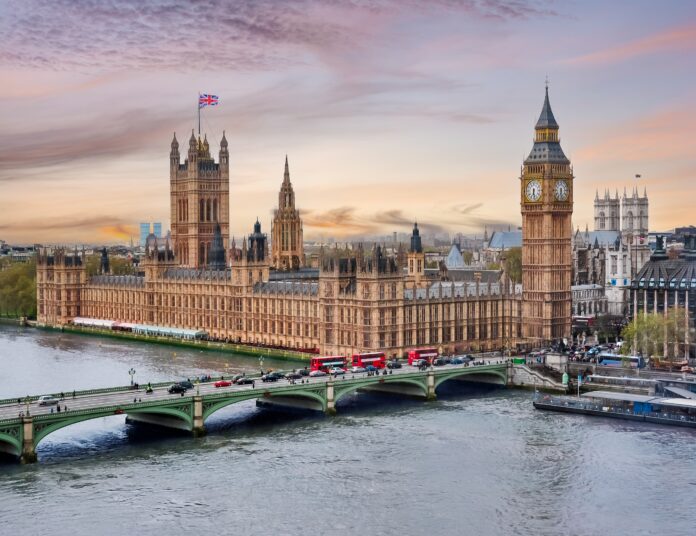Blogger Najm Al-Din says Muslims should temper their excitement about getting MPs into Parliament as Palestine’s case can never be fairly represented in an institution which is in the pocket of oligarchs, vested interests and the war lobby.
With election season underway, courting the Muslim vote has proven an uphill struggle for the UK’s mainstream political parties.
Unlike previous campaigns where door-to-door canvassing and party pledges in mosques were crucial to securing votes in Muslim constituencies, Tory and Labour politicians have encountered fierce opposition from Britain’s Muslim communities, mainly over the bipartisan support for Israel’s genocide in Gaza.
Not only do the vast majority of Muslims feel alienated by the two-party system, for the first time in years many have sought to break the duopoly in British politics by strategically voting for Pro-Palestine independent candidates and register their disapproval with incumbents and establishment politics as a whole.
But as refreshing as it is to see Muslims informing their political choices based on the plight of their brothers and sisters in Gaza, there is a dangerous misconception lingering in our community about the way in which the modern democratic system operates.
Corporatocracy
Far from representing the electorate, those at the highest levels of UK executive office are beholden to corporate influence and primarily function to advance private business interests.
Subscribe to our newsletter and stay updated on the latest news and updates from around the Muslim world!
This notoriously close relationship between Britain’s ruling class and the private sector is not an exception amongst established democracies but a fundamental characteristic of the modern neoliberal state.
Be it foreign policy, public health, net-zero or the economy, a considerable level of decision-making with far-reaching implications for millions of Britons is outsourced to an unelected bureaucracy consisting of corporate sponsored think tanks, third-sector agencies and professional consultancies.
This corporate capture of the modern democratic state has been likened to a “silent coup” which privileges moneyed interests with a disproportionate level of power and responsibility for agenda-setting, thus explaining the revolving doors and conflict of interests which typify Western democracies.
Representative governance
Like much of the Western world, British politics has ceased to be about representation.
Instead, the parliamentary system has been converted into a platform for market entry camouflaged by two-party competition, where elected representatives assume the role of corporate brokers, overseeing the distribution of revenue and capital in private enterprise.
The empowering capitalism which modern democracies promised to usher failed to materialise, but hardly through accident.
Rather, the system has been designed to perversely reward a gilded elite whose supranational influence enables them to dictate how resources are allocated, which wars to pursue and what domestic and foreign policies to endorse for their own power and enrichment.
Advisory Boards
A stark illustration of how this power operates in Britain was seen during the first lockdown, when ultra wealthy party donors were ushered into the heart of the Tory government under the guise of secret advisory boards to influence decision-making.
Since then, it emerged that the board members operating beyond the remit of transparency laws consisted of billionaire construction and property tycoons who were granted privileged access to former PM Boris Johnson and some of his closest confidants.
Many were agitating Tory Ministers to relax the rules on public distancing, given the adverse impact such laws had on their businesses. Others consisted of powerful oligarchs with a history of generous donations to the conservatives, who not only lobbied the government on pandemic preparedness and procurement but also advised against raising the tax burden for high-net worth individuals.
Special Economic Zones
Britain’s corporatocracy also negotiates relaxed regulations and preferential tax rates in Special Economic Zones (SEZs), which are specially marked enclaves within the national borders of a country that has more liberal economic laws than the rest of the nation.
While the purported aims of SEZs are to attract foreign investment and drive growth and innovation, many labour and union laws are flagrantly violated in SEZs, leading some to view these autonomous zones which operate outside of central government control as examples of sweatshop globalisation.
SEZs are not exclusive to authoritarian governments. These prosperity zones are propping up across British cities, towns and villages, with no public consultation and the global think-tanks endorsing these privately owned charter cities have already penetrated the highest rungs of political office, steering the UK’s Brexit negotiations with no mandate.
From tax obligations to environmental regulations, multinational corporations use their immense influence to manipulate international tribunals to punish states which threaten their investments. Through preemptive rights to litigate against nations which could impede their trade agreements, many unaccountable arbitration proceedings around the world favour an unelected bureaucracy of foreign investors, in the absence of any democratic consensus.
It is this exclusive club of elite donors with the strongest lobbying power which have usurped the powers traditionally vested in elected cabinets and are running legislatures as if they were company subsidiaries, masquerading as a force for the public good by selling the false dream of growth and prosperity through deregulated markets, privatisation and trickle-down economics.
The interests of a cabal of privateers and an endemic cash for access culture is so woven into the fabric of Britain’s mainstream parties that the entire democratic system has been reduced to a quid pro quo farce, rendering our votes meaningless.
Instead of observing the voting ritual every election cycle in the futile hope of achieving systemic change, it’s time we pay attention to these mechanisms utilised by transnational corporations and power brokers to ultimately cede popular sovereignty to private economic interests.
Military industrial complex
An important branch of Britain’s unelected bureaucracy which forms a critical part of the nexus of power is the military industrial complex.
The special relationship between the Ministry of Defence and private arms companies is no secret, with a significant portion of the UK’s defence budget being spent on private services.

With naval bases operated by private contractors and military training programs outsourced through public-private partnerships, the authority over UK defence has shifted to largely unaccountable interest groups, much like the laws surrounding taxation, Brexit and public health which favour wealthy donors.
Britain’s largest arms company – BAE Systems – is among the chief beneficiaries of this privatisation and outsourcing and senior members from the small number of companies dominating the market have entered the highest rungs of media and been seconded to positions at the heart of the MoD.
There is a well documented history of the UK Foreign office being captured by energy giants such as BP and Shell, which have close affiliations with the intelligence services.
Britain’s endorsement of wars, coups and dictators in countries like Iraq, Libya, Nigeria and Iran, have been driven primarily by corporate interests, with the aim of opening up energy markets and negotiating lucrative drilling contracts to enrich British businesses.
Pro Israel Lobby
Another core component of the military industrial complex to which the British government remains wedded is the pro-Israel lobby.
Funded in large part by transnational corporate actors and deeply embedded in neoliberal and neoconservative circles for decades, the UK’s pro-Israel lobby has functioned to shore up political, economic and military support for Israel while thwarting campaigns for Palestinian liberation by silencing critics of Zionism.
Not only was Britain instrumental in the creation of a Jewish homeland in Palestine and a major hub in Zionist state building, both the Labour and Conservative Friends of Israel groups have emerged as a major kingmaker in Westminster, steering Britain’s foreign policy in the Middle East.
According to an investigation by Declassified UK, more than half of Labour’s shadow cabinet are listed as supporters of the Labour Friends of Israel and over a third have received donations from pro-Israel lobby groups. 130 Conservative MPs have also been recipients of donations and some have accepted funding to travel to Israel at the peak of its genocide in Gaza, going to extreme lengths to whitewash Israel’s barbarity.
Bankrolled by several leaders of industry and business tycoons who recognise the long term geopolitical and economic importance of maintaining an imperial footprint in the Middle East, the “funding fathers” of Anglo-Zionism presiding over the movement’s rightward shift are a key node in the UK’s corporate power structure and enjoy considerable access to policymakers.
Having made significant inroads in British politics over generations, the unstinting bipartisan support for Zionism is a non-negotiable pillar of UK foreign policy.
Independent candidates
With degrading public trust in officialdom and growing anger over the government’s unconscionable support for Israel, it’s unsurprising that Muslims in Britain are throwing their weight behind independent candidates who are campaigning on a pro-Palestine platform.
However, the suggestion that independent candidates can effectively represent the cause of Palestine in parliament is misleading, as these candidates have no power except to work through the existing Globalist-controlled institutions, which serve the interests of wealthy party donors and a powerful circle of non-governmental insiders.
Just as Jeremy Corbyn was ousted to the fringes of British politics following accusations of antisemitism, independent candidates cannot overturn the pro-Israeli consensus in Westminster because British democracy functions through a uniparty globalist system which genuflects to big donors and a military industrial complex that deems the preservation of Israel a key strategic priority.
Therefore, Palestine’s case can never be fairly represented in a Parliament which ultimately derives its legitimacy from pandering to oligarchs and the war lobby.
While it is true that the pro-Zionist status quo has lost control of the narrative, the predatory system in place can channel voter dissatisfaction via pro-Palestine independent candidates, knowing very well they can be subsumed by the juggernaut and represent little more than a pressure valve to give voice to the public outrage.
This in no way implies that the independent candidates who are impassioned by the Palestinian cause are insincere. Rather, their representation in Parliament will suffice to appease the swelling of righteous indignation among millions of people. It changes nothing but gives the illusion that the controlled media and hawks in government are listening to and even supporting public opinion.
The reality is that there are malign influences which keep the political machine operating as a diversionary puppet show, obscuring how Britain is really a plutocracy in form if not in name.





















